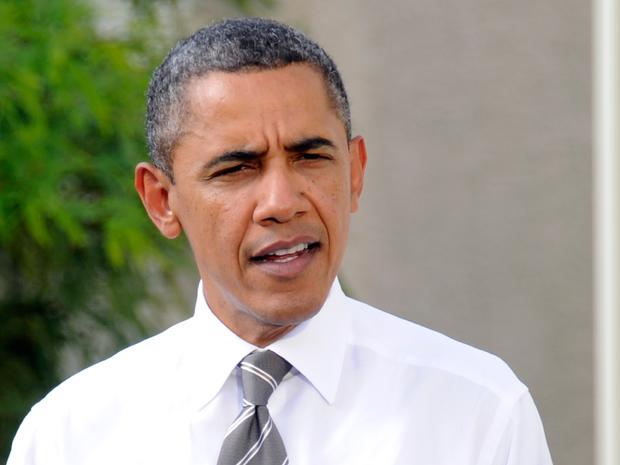Obama suggests he will make final call next year on Keystone XL oil pipeline
President Obama suggested Tuesday that he - not the State Department - will make the final call on whether to build a controversial oil pipeline spanning from Canada to Texas, noting that his decision would weigh the environmental and health risks the oil pipeline would pose against potential job creation.
While the State Department is in charge of analyzing data surrounding the theoretical construction of the Keystone XL pipeline, Mr. Obama told Nebraska's KETV Tuesday that "I'll be measuring these recommendations when they come to me."
The State Department on Wednesday said it still hoped to make an announcement by the end of the year, but it would not rule out a decision next year. Officials have more than once said they hoped to meet a self-imposed timetable for deciding this year, but have recently signaled a decision would be delayed. The Obama administration has been widely expected to approve the controversial project over strong objections from political allies in the environmental advocacy world. Proponents point to the thousands of potential jobs that could be created as part of the project.
"They'll be giving me a report over the next several months," Mr. Obama said of the State Department, hinting that a decision would not come this year. "My general attitude is, what is best for the American people? What's best for our economy, both short-term and long-term? But also, what's best for the health of the American people."
White House Press Secretary Jay Carney downplayed the president's comment, noting the decision would ultimately "reflect the president's views."
"What the president said yesterday is wholly consistent with the process we've described... the review of this decision is housed at the State Department by executive order because of all the considerations that have to be taken, have to be reviewed, and that process will move forward and is not done in a vacuum," Carney told reporters at the White House. "This is the president's administration - you can expect the ultimate outcome of this process will reflect the president's views."
Liz Barratt-Brown, a senior attorney with the Natural Resources Defense Council, a New York based environmental advocacy organization, said she thought it was Mr. Obama's responsibility to decide the outcome himself.
"We really do hope that he is the one to make this decision," she told CBS News Political Hotsheet.
"We feel that the process to date has been really mismanaged by the State Department," Barratt-Brown continued, noting that "an issue of this magnitude or importance really has to be made by the president."
TransCanada's proposed 1,700-mile underground oil pipeline, which has been in the works for three years and would link the tar sands fields of northern Alberta to oil refineries on the Texas Gulf Coast, falls under the State Department's jurisdiction because it crosses U.S. borders. The State Department, however, has been widely criticized for its analysis of the project, which many believed to skew in favor of TransCanada's interests without adequately addressing the potential negative impacts of the project.
Opponents of the pipeline decry it as deeply hazardous to the environment and, potentially, the health and safety of the American people. A number of lawmakers in Nebraska, including the state's Republican Governor, have also objected to the project - particularly because the pipeline would pass through an aquifer that provides a major portion of the state's drinking water.
In an October editorial, the New York Times wrote that approving the pipeline would be a "mistake" and that it was time to ask "whether this country should keep conducting business as usual -- that is, succumbing to the status quo of politics and big oil -- or whether it will seriously grapple with the reality of climate change."
According to the president's remarks, he is taking environmental and safety matters to heart.
"Folks in Nebraska obviously would be directly impacted, and so we want to make sure that we're talking the long view on these issues," he said. "We need to encourage domestic natural gas and oil production, we need to make sure that we have energy security and aren't just relying on Middle East sources, but there's a way of doing that and still making sure that the health and safety of the American people and folks in Nebraska are protected - and that's how I'll be measuring these recommendations when they come to me."
When asked if the potential for job creation will come into consideration when making the decision, the president noted "it does" but that "folks in Nebraska, like all across the country, aren't going to say to themselves, we'll take a few thousand jobs if it means our kids are potentially drinking water that would damage their health or I rich land that is so important to agriculture in Nebraska ends up being adversely affected."
"When somebody gets sick, that's a cost that society has to bear as well," he said.
Barratt-Brown contends that the issue gives the president a crucial opportunity to make good on his campaign promises.
"I think that's the issue for the president," she said. "He has promised to address climate change, promised to help us transition to a clean-energy program, promised to protect Americans' drinking water...This pipeline puts these issues right up front and center."

